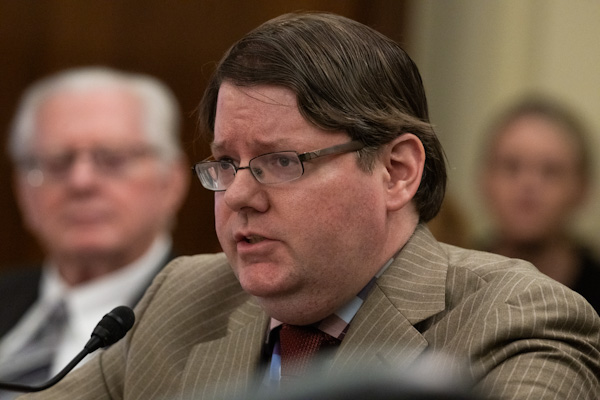Judiciary
Judicial Council Clears Vaden Over Columbia Clerk Boycott
April 10, 2025, 11:36 am CDT
Judge Stephen A. Vaden of the U.S. Court of International Trade responds during a U.S. Senate confirmation hearing for the deputy secretary of the Department of Agriculture. (Photo by Mattie Neretin/Sipa USA/Sipa via the Associated Press)
The 7th U.S. Circuit Court of Appeals’ judicial council has ruled that Judge Stephen A. Vaden did not breach ethics rules by opting not to hire law clerks from Columbia University or its law school. This decision arises amid the judge’s objection to the university’s handling of disruptions caused by pro-Palestinian protests, which he and 12 other judges referred to as fostering an environment of bigotry.
On April 8, 2025, the council dismissed a complaint lodged against Vaden, affirming his actions did not compromise public confidence in the judiciary nor undermine the integrity of his judicial office.
Judges involved in the boycott articulated their concerns in a letter to Columbia, expressing a belief that the institution has not upheld fundamental principles of higher education, such as civility in discourse and respect for diverse viewpoints. The judicial council supported Vaden’s stance, stating, “A judge may refuse to hire law clerks from a law school or university that has, in the judge’s view, failed to foster important aspects of higher education.”
Following the council’s ruling, Vaden’s nominations—President Donald Trump has nominated him for the position of deputy secretary of the Department of Agriculture—remain in the spotlight. His confirmation hearing occurred the same day as the ruling, intensifying discussions surrounding judicial ethics and institutional integrity.
Importantly, the ethics complaint against Vaden was referred to the judicial council by the chief judge of the U.S. Court of International Trade. The complaint originator has been convicted and imprisoned for firebombing and vandalizing synagogues, raising questions about the motives behind the complaint.
Vaden was represented in this matter by the First Liberty Institute, a conservative legal organization, and prominent legal counsel Lisa Blatt of Williams & Connolly. In a broader context, similar ethics complaints against 11 other judges involved in the boycott have also been dismissed, including complaints against notable federal appeals judges such as James C. Ho of the 5th Circuit and Elizabeth L. Branch of the 11th Circuit.
This ruling may have significant implications for future discussions on the intersection of judicial ethics and freedom of speech in academic settings.

